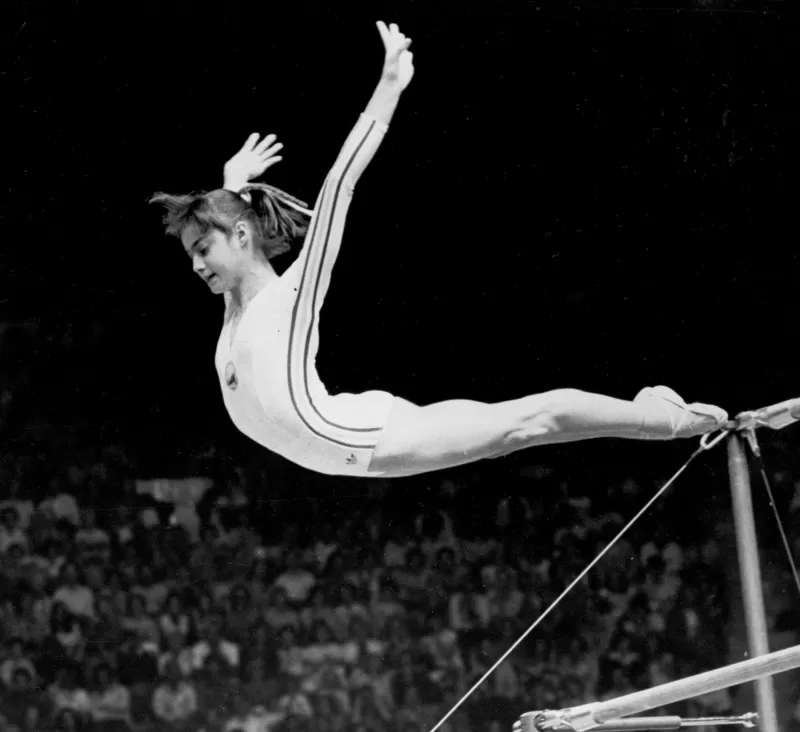The contemporary gymnast Simone Biles is currently considered the best gymnast in history. Until the irruption of this gymnast in the panorama of sporting successes, Nadia Comaneci was, indisputably, the maximum reference of Artistic Gymnastics.

Nadia Comaneci
Onesti (Rumanía), 12-11-1961
Periodo de actividad: 1976 — 1981
Clasificación geográfica: Europa > Rumania
Movimientos socio-culturales
Edad Contemporánea
Grupos por ámbito de dedicación
Deportistas
Contexto de creación femenina
Reseña
Nadia Comaneci became a world icon, becoming in 1976 in Montreal the first gymnast to achieve the highest score at the Olympic Games: a 10, which was considered a perfect exercise. She became Olympic champion at just fourteen years of age. She went on to score seven more tens over the course of the competitions at the Olympics.
Actividades
Justificaciones
Biografía
Nadia Comaneci began practicing Artistic Gymnastics in childhood, and stood out at a very early age at the national level. In 1975, she won her first European title as European champion in Skien (Norway), where she surpassed the Soviet gymnasts, great dominators in this sport. That year she participated in the America's Cup, where she performed for the first time in the history of the sport a double backward somersault on the asymmetrical parallel apparatus. The American press named her best athlete of the year. The following year, in 1976, she was proclaimed Olympic champion in Montreal at only 14 years of age; she achieved the first 10 in the history of Olympic gymnastics and obtained 7 more during the days of competition. Later, in 1979, she won her third consecutive European champion title, being the first gymnast to do so (not even a man had ever done so). In the 1980 Moscow Olympic Games, she won two gold medals and two silver medals. After these Olympic Games, and as a result of the social and economic crisis of the dictatorial state of Romania, led by Ceaucescu, Nadia Comanecci ends her career as a gymnast. Subsequently, she left her country, crossing into Hungary, at the risk of being captured, to seek political asylum in the United States, where she formed a family with Bart Conner (a former American gymnast). In 1996, her wedding was celebrated in Bucharest (Romania), televised throughout the country and with a reception in the old presidential palace, with thousands of attendees gathered in the surrounding area. She currently works as a sports commentator and participates in numerous initiatives in sporting events, gymnastics and the media.
Obras
- Comaneci, Nadia (2003). Cartas a una joven gimnasta.
- Comaneci, Nadia (1981). The autobiography of Nadia Comaneci.
Bibliografía
Iríbar, Amaya (2010), “Era demasiado joven para darme cuenta de lo que había hecho”, El País <https://elpais.com/diario/2010/03/07/deportes/1267916409_850215.html> (12/1/2022)
BBC Mundo, Redacción (2016), “El 10 de Nadia Comaneci: el día que el deporte alcanzó la perfección”, BBC News <https://www.bbc.com/mundo/deportes-36825157> (12/1/2022)
Mesa, Eduardo (2021) “Nadia Comaneci, el hada cautiva”, La Vanguardia <https://www.lavanguardia.com/historiayvida/historia-contemporanea/20210717/7598135/nadia-comaneci-hada-cautiva.html> (12/1/2022)
Leyendas del Deporte (2021). “NADIA COMANECI. Biografía y datos sorprendentes | Leyendas del Deporte” <https://www.youtube.com/watch?v=Ko153ebXFNE> (12/1/2022)
Enfoque Didáctico
It can be worked in Physical Education in:
- "Games and Sports" content block: gymnastic skills/"problem solving in motor situations", 1st ESO.
- Block of contents of "Games and Sports": coordination and agility, 1st ESO.